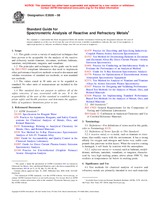Potrebujeme váš súhlas na využitie jednotlivých dát, aby sa vám okrem iného mohli ukazovať informácie týkajúce sa vašich záujmov. Súhlas udelíte kliknutím na tlačidlo „OK“.
ASTM E2626-08
Standard Guide for Spectrometric Analysis of Reactive and Refractory Metals
Automaticky preložený názov:
Štandardné Príručka pre spektrometrickou analýzu reaktívne a žiaruvzdorné kovy
NORMA vydaná dňa 15.6.2008
Informácie o norme:
Označenie normy: ASTM E2626-08
Poznámka: NEPLATNÁ
Dátum vydania normy: 15.6.2008
Kód tovaru: NS-45755
Počet strán: 6
Približná hmotnosť: 18 g (0.04 libier)
Krajina: Americká technická norma
Kategória: Technické normy ASTM
Anotácia textu normy ASTM E2626-08 :
Keywords:
AA, AAS, AES, alloys, arc, AS-AES, atomic absorption, atomic emission, DCP-AES, direct current plasma, FAAS, GD-AES, GD-MS, glow discharge, hafnium, ICP, ICP-MS, inductively coupled plasma, inductively coupled plasma-mass spectrometry, mass spectrometry, molybdenum, niobium, reactive metals, refractory metals, spark, spectrometry, tantalum, tungsten, vanadium, x-ray emission, XRF, zirconium, ICS Number Code 77.040.30 (Chemical analysis of metals)
Doplňujúce informácie
| Significance and Use | ||||||||||||||||||||||||||||||||
|
Test methods for chemical analysis of reactive and refractory metals are primarily intended to test such materials for compliance with compositional specifications. It is assumed that all who use this guide will be trained analysts capable of performing common laboratory procedures skillfully and safely. It is expected that work will be performed in a properly equipped laboratory under appropriate quality control practices such as those described in Guide E 882 and Practice E 2437, as well as in ISO 17025 and ISO Guide 32. This guide is intended to aid analytical chemistry laboratories in the analysis of reactive and refractory metals and their alloys when no specific standard test methods are available. The principles incorporated in this practice can also be applied in laboratories that wish to validate and document non-standard test methods. The analysis of reactive and refractory materials is typically performed by only a small number of laboratories. Few of these laboratories have analytical instrumentation in common for use in interlaboratory proficiency testing programs. This requires the use of within-laboratory developed test methods that vary between laboratories. It is intended that this practice will give general guidance to experienced personnel that will assist them in the development of a procedure that will meet their analytical objectives. Practice E 2438 provides guidance for the development and documentation of an In-House Standard Operating Procedure (SOP). |
||||||||||||||||||||||||||||||||
| 1. Scope | ||||||||||||||||||||||||||||||||
|
1.1 This guide covers a variety of analytical techniques that have proven to be acceptable for the analysis of the reactive and refractory metals titanium, zirconium, niobium, hafnium, tantalum, molybdenum, tungsten, and vanadium. 1.2 The principles and techniques in this guide can be used by ISO 17025 compliant laboratories that need to implement other performance-based test methods or need to document and validate extensions of standard test methods, or non-standard test methods. 1.3 This standard does not purport to address all of the safety concerns, if any, associated with its use. It is the responsibility of the user of this standard to establish appropriate safety and health practices and determine the applicability of regulatory limitations prior to use. |
||||||||||||||||||||||||||||||||
| 2. Referenced Documents | ||||||||||||||||||||||||||||||||
|




 Cookies
Cookies
